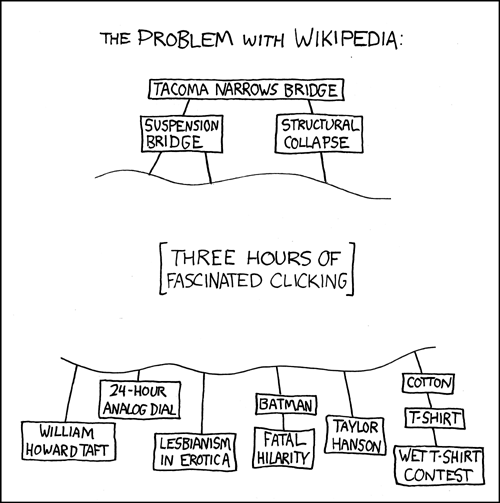It seems like an easy game, and sometimes it is. Other times, it's so unfathomably hopeless that you begin to wonder if the page you're looking for even has links to it. Yet even in its difficulty, I usually get there eventually. You almost have to at some point—unless you're just not paying attention, the nature of Wikipedia will show you links that get you closer and closer to your destination. At its heart, the game works because of Wikipedia's interconnectivity. But it's a bit more complicated than that.
As I'm sure you've noticed, one of the things that makes Wikipedia so great is that every article contains numerous links pointing to other articles, however vaguely related. A two minute fact check can turn into a half hour experience of fifty–some–odd articles about tea kettles and the 1954 All–Ireland Senior Football Championship. The webcomic xkcd points out this problem with Wikipedia:
One of my favorite parts of xkcd is the mouseover text. In another comic about Wikipedia, Randall introduced me to the clever property of Wikipedia that on any article, if you click the first link not italicized or in parentheses, and do so for every following article, you will eventually land on the site's entry on Philosophy.
This shows how interconnected Wikipedia is, but how true is it? Mat Kelcey calculated this back in 2011. At the time, Wikipedia was significantly smaller, and it's since been heavily edited, so the following figures won't be correct anymore, but they'll still demonstrate the concept. He found that about 3.6 million articles did indeed lead to Philosophy, while 100,000 did not (half led to dead ends and the other half got stuck in cycles). This is only 2.7% of articles, so it's safe to say that practically all of Wikipedia leads to Philosophy.
Anyway, this concept eventually introduced me to the Wikipedia game. I thought it was cool that you could go to a specific page (Philosophy) from any other page, so naturally I found it even cooler that if you tried hard enough you could essentially get to any page from any other page.
What's even cooler though, is the fact that we can do this. And we can do it quickly. Not as quickly as a computer, but as creatures who have to read things word by word and comprehend everything before even thinking about moving forward, it's pretty cool. In the game, you have to skim the page, be on the lookout for links that could lead you closer to your destination, be able to plan out moves several articles in advance, predict what links a certain page might have, understand the basic structure of Wikipedia and where a link is likely to be, and a whole host of other things. And all of this takes place in the span of a few minutes of furious clicking. The Wikipedia game may be simple, but it's a fascinating mental exercise that's also fairly competitive.
It's also good to know the background of the page you're looking for, in case in the rush of things you mistake Kevin Durant for an NFL player (even though you clearly know he isn't, he's an NHL player).
What's even cooler though, is the fact that we can do this. And we can do it quickly. Not as quickly as a computer, but as creatures who have to read things word by word and comprehend everything before even thinking about moving forward, it's pretty cool. In the game, you have to skim the page, be on the lookout for links that could lead you closer to your destination, be able to plan out moves several articles in advance, predict what links a certain page might have, understand the basic structure of Wikipedia and where a link is likely to be, and a whole host of other things. And all of this takes place in the span of a few minutes of furious clicking. The Wikipedia game may be simple, but it's a fascinating mental exercise that's also fairly competitive.
It's also good to know the background of the page you're looking for, in case in the rush of things you mistake Kevin Durant for an NFL player (even though you clearly know he isn't, he's an NHL player).

No comments :
Post a Comment